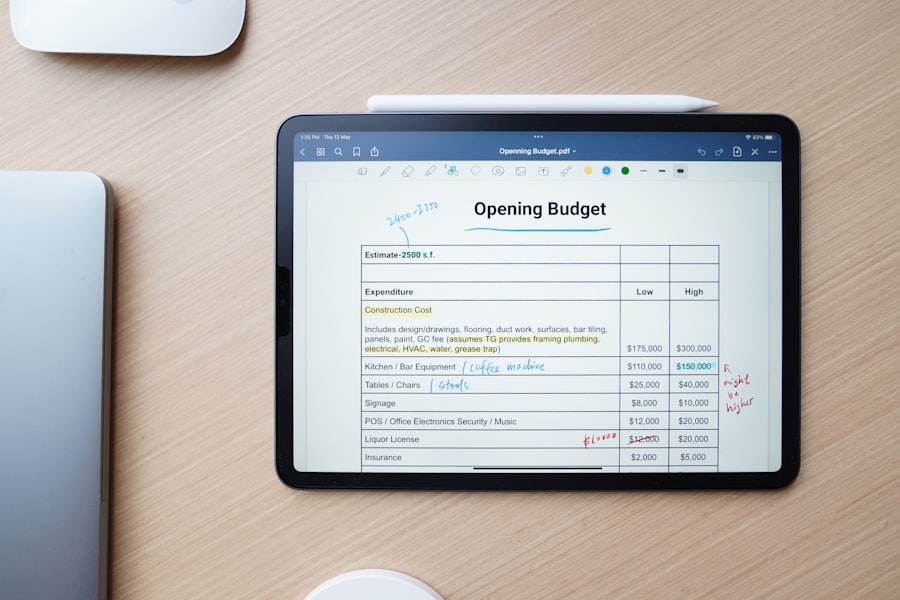Creating a budget is an essential step towards achieving financial stability and success. It allows you to have a clear understanding of your income and expenses, enabling you to make informed decisions about your finances. Budgeting helps you reduce debt, save money, and achieve your financial goals. Without a budget, it’s easy to overspend, accumulate debt, and struggle to meet your financial obligations.
One of the key benefits of budgeting is that it helps you reduce debt. By tracking your expenses and income, you can identify areas where you can cut back and allocate more money towards paying off debt. This can help you become debt-free faster and save money on interest payments. Additionally, budgeting allows you to prioritize your debt payments and develop a plan to pay off your debts systematically.
Another benefit of budgeting is that it helps you save money. By tracking your expenses, you can identify areas where you are overspending and find ways to cut back. This could be as simple as reducing discretionary expenses like eating out or entertainment. By saving money, you can build an emergency fund, invest for the future, or achieve other financial goals.
Step 1: Gather Information About Your Income and Expenses
The first step in creating a budget is to gather information about your income and expenses. This involves knowing how much money you earn each month and understanding where your money is going. Start by collecting all your bank statements, pay stubs, and receipts for the past few months. This will give you a clear picture of your income and expenses.
To gather information about your income, look at your pay stubs or bank statements to determine how much money you earn each month after taxes and deductions. If you have multiple sources of income, make sure to include all of them.
To gather information about your expenses, go through your bank statements and receipts to see where your money is going. Categorize your expenses into different categories such as housing, transportation, food, utilities, entertainment, and debt payments. This will help you understand where you are spending the most and identify areas where you can cut back.
Step 2: Categorize Your Expenses for Better Financial Management
Categorizing your expenses is an important step in budgeting as it allows you to have a better understanding of your spending habits and make informed decisions about your finances. By categorizing your expenses, you can identify areas where you can cut back and allocate more money towards your financial goals.
Some common expense categories include housing, transportation, food, utilities, entertainment, and debt payments. By categorizing your expenses into these categories, you can see how much money you are spending in each area and identify areas where you can reduce your spending.
For example, if you notice that you are spending a significant amount of money on eating out, you can make a conscious effort to cook more meals at home and reduce your dining out expenses. Similarly, if you find that you are spending a lot on transportation, you can explore alternative options such as carpooling or using public transportation to save money.
Step 3: Set Realistic Financial Goals
Setting realistic financial goals is an important step in budgeting as it gives you something to work towards and helps you stay motivated. Financial goals can vary from person to person and may include paying off debt, saving for a down payment on a house, or building an emergency fund.
When setting financial goals, it’s important to make them specific and measurable. For example, instead of saying “I want to save money,” set a specific goal like “I want to save $5,000 for a down payment on a house in the next year.” This gives you a clear target to work towards and allows you to track your progress.
It’s also important to set realistic goals that are achievable based on your current financial situation. Setting goals that are too ambitious can lead to frustration and disappointment. Start by setting small, achievable goals and gradually increase them as you make progress.
Step 4: Create a Budget Plan That Works for You
Once you have gathered information about your income and expenses, categorized your expenses, and set realistic financial goals, it’s time to create a budget plan that works for you. There are different budgeting methods you can choose from, such as the 50/30/20 rule or zero-based budgeting.
The 50/30/20 rule is a popular budgeting method that suggests allocating 50% of your income towards needs, 30% towards wants, and 20% towards savings and debt payments. This method provides a simple framework for budgeting and ensures that you are allocating your money in a balanced way.
Zero-based budgeting is another effective budgeting method where you allocate every dollar of your income towards a specific category. This method requires you to give every dollar a job, whether it’s for paying bills, saving, or investing. By assigning every dollar a purpose, you can ensure that you are making the most of your money.
When creating a budget plan, it’s important to consider your lifestyle and financial goals. If you enjoy dining out or traveling, make sure to allocate some money towards these activities. The key is to find a balance between enjoying your money now and saving for the future.
Step 5: Track Your Spending and Adjust Your Budget as Needed

Creating a budget is just the first step; it’s important to track your spending and adjust your budget as needed to ensure that you stay on track. Tracking your spending allows you to see if you are sticking to your budget and identify areas where you may be overspending.
There are several ways to track your spending. You can use a budgeting app or software that automatically categorizes your expenses and provides you with reports and insights. Alternatively, you can use a spreadsheet or a notebook to manually track your expenses. The key is to find a method that works for you and allows you to easily track your spending.
Once you start tracking your spending, you may realize that you need to make adjustments to your budget. For example, if you find that you are consistently overspending in a particular category, you may need to reduce your budget for that category or find ways to cut back. On the other hand, if you find that you have extra money left over at the end of the month, you may want to allocate it towards your financial goals or increase your savings.
Tips for Sticking to Your Budget and Achieving Your Financial Goals
Sticking to a budget and achieving your financial goals requires discipline and commitment. Here are some tips to help you stay motivated and committed to your budget:
1. Set milestones: Break down your financial goals into smaller milestones and celebrate each milestone you achieve. This will help keep you motivated and give you a sense of accomplishment.
2. Automate your savings: Set up automatic transfers from your checking account to your savings account each month. This will make it easier for you to save money and ensure that you are consistently working towards your financial goals.
3. Find an accountability partner: Share your budget and financial goals with a friend or family member who can hold you accountable. Having someone to check in with regularly can help keep you on track and provide support when needed.
4. Reward yourself: Set up rewards for yourself when you meet certain financial milestones or stick to your budget for a certain period of time. This could be treating yourself to a small splurge or taking yourself out for a nice meal.
5. Stay focused on the big picture: Remind yourself of why you are budgeting and what you hope to achieve. Whether it’s financial freedom, a comfortable retirement, or the ability to travel, keeping your long-term goals in mind can help you stay motivated and committed to your budget.
Importance of Emergency Funds in Finance Management
Having an emergency fund is crucial for financial stability and success. An emergency fund is a savings account that is specifically set aside for unexpected expenses such as medical bills, car repairs, or job loss. It provides a safety net and helps you avoid going into debt when unexpected expenses arise.
Having an emergency fund is important because it allows you to handle unexpected expenses without derailing your financial goals. Without an emergency fund, you may be forced to rely on credit cards or loans to cover unexpected expenses, which can lead to debt and financial stress.
To build an emergency fund, start by setting aside a portion of your income each month. Aim to save at least three to six months’ worth of living expenses in your emergency fund. This will provide you with a cushion in case of job loss or other emergencies.
How to Save Money and Cut Expenses in Your Budget
Saving money and cutting expenses is an important part of budgeting and financial management. Here are some tips to help you save money and cut expenses:
1. Meal planning: Plan your meals for the week and make a grocery list before going shopping. This will help you avoid impulse purchases and reduce food waste.
2. Negotiate bills: Call your service providers such as cable, internet, and insurance companies to negotiate lower rates. Many companies are willing to offer discounts or lower rates to retain customers.
3. Reduce energy consumption: Lower your energy bills by turning off lights when not in use, using energy-efficient appliances, and adjusting your thermostat.
4. Cancel unused subscriptions: Review your subscriptions and cancel any that you no longer use or need. This could include gym memberships, streaming services, or magazine subscriptions.
5. Shop smart: Compare prices before making a purchase and look for sales or discounts. Consider buying generic brands instead of name brands to save money.
6. Cut back on discretionary expenses: Identify areas where you can cut back on discretionary expenses such as eating out, entertainment, or shopping. Look for free or low-cost alternatives for entertainment, such as visiting parks or attending community events.
By finding ways to save money and cut expenses, you can free up more money to allocate towards your financial goals and increase your savings.
The Benefits of Creating a Budget for Financial Stability and Success
Creating a budget is an essential step towards achieving financial stability and success. It allows you to have a clear understanding of your income and expenses, prioritize your financial goals, and make informed decisions about your finances. By budgeting, you can reduce debt, save money, and achieve your financial goals.
Budgeting helps you reduce debt by tracking your expenses and identifying areas where you can cut back. It also helps you save money by allowing you to allocate your income towards your financial goals. By setting realistic financial goals and creating a budget plan that works for you, you can stay motivated and committed to your budget.
Tracking your spending and adjusting your budget as needed ensures that you stay on track and make progress towards your financial goals. By building an emergency fund, saving money, and cutting expenses, you can increase your financial stability and be better prepared for unexpected expenses.
In conclusion, creating a budget is an important tool for managing your money effectively. It provides a roadmap for achieving financial stability and success. By taking the time to gather information about your income and expenses, categorize your expenses, set realistic financial goals, create a budget plan that works for you, track your spending, and adjust your budget as needed, you can take control of your finances and achieve your financial goals. So take action today and start creating a budget that will set you on the path to financial stability and success.









Add Comment